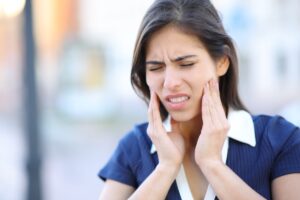Understanding Bruxism and TMJ
Let’s face it: jaw pain is no fun. The jaw is such a huge part of your life, and most people can take all the work it does for granted. But when you have pain in your jaw, it affects the very basic things you do every day—talking, sleeping, eating. If you start researching jaw pain, two terms that you may not have heard before will start popping up as a result: “bruxism” and “TMJ” (or sometimes “TMD”). So: bruxism vs. TMJ…which are you experiencing? What is the difference?
First we will start with basic definitions, and then we will break it down all the way through action steps:
Bruxism vs TMJ Definitions
Bruxism: Bruxism is the medical term for teeth grinding or clenching. It is a habit people fall into, tensing their jaw and grinding, often at night.
TMJ: The “TMJ” is the temporomandibular joint, or hinge point of the jaw. “TMD” is “temporomandibular disorder.” Both TMJ and TMD are often used interchangably to refer to a painful condition where the TMJ is not properly aligned and so it does not function properly, causing jaw pain.
Bruxism vs TMJ Causes
Bruxism is a bad habit that can be a reflex caused by stress or anxiety. It can also be caused by orthodontic issues, like a bad bite or missing teeth. A temporary problem with teeth grinding may form from conditions like colds, ear infections, or allergies.
TMJ may also be an orthodontic issue caused by a bad bite. It also might be caused by trauma that knocks the jaw out of alignment. And wear and tear—like from bruxism(!) may lead to TMD.
Bruxism vs TMJ Symptoms
You may think anyone who experiences bruxism would know—you would be aware if you grind your teeth, right? But since it happens at night and involuntarily, you may not even be aware! A lot of people wake up with a headache, ear ache, or jaw pain and can’t pinpoint the cause. It could be that you are grinding your teeth while you sleep! Other signs include wear and tear on the front and back teeth, or even loose or fractured teeth.
Some TMJ symptoms are what you would expect: jaw pain, clicking or popping sounds, or limited jaw opening and closing. However, TMJ is often difficult to discover because pain can radiate out—so some people experience unexplained headaches or pain in the neck, shoulders, ear, or face. It may even cause dizziness and sleep problems.
Bruxism vs TMJ Treatments and Solutions
If bruxism has not yet led to TMD, this habit can be alleviated with a fairly simple solution—a night guard to wear at night. A dentist trained in sleep dentistry can assess and fit you with a guard.
Because TMJ is a progressive disorder, it is essential that you solve the problem as soon as possible. Also, since there are various stages and causes of TMD, the solutions vary from a night guard or oral appliance, orthodontics to correct a bite, teeth reshaping or crowns, or in extreme cases depending on the level of deterioration and pain, surgery. However, conservative approaches are always explored before making the decision to handle surgically.
Bruxism vs TMJ Action Steps
Here’s where the two align. If you have jaw pain of any kind or suspect you have a problem with teeth grinding, it’s a great idea to be evaluated by a dentist who is trained in treating TMJ. We can evaluate your situation, assess the problem, and get you on the way out of pain and to better health!






